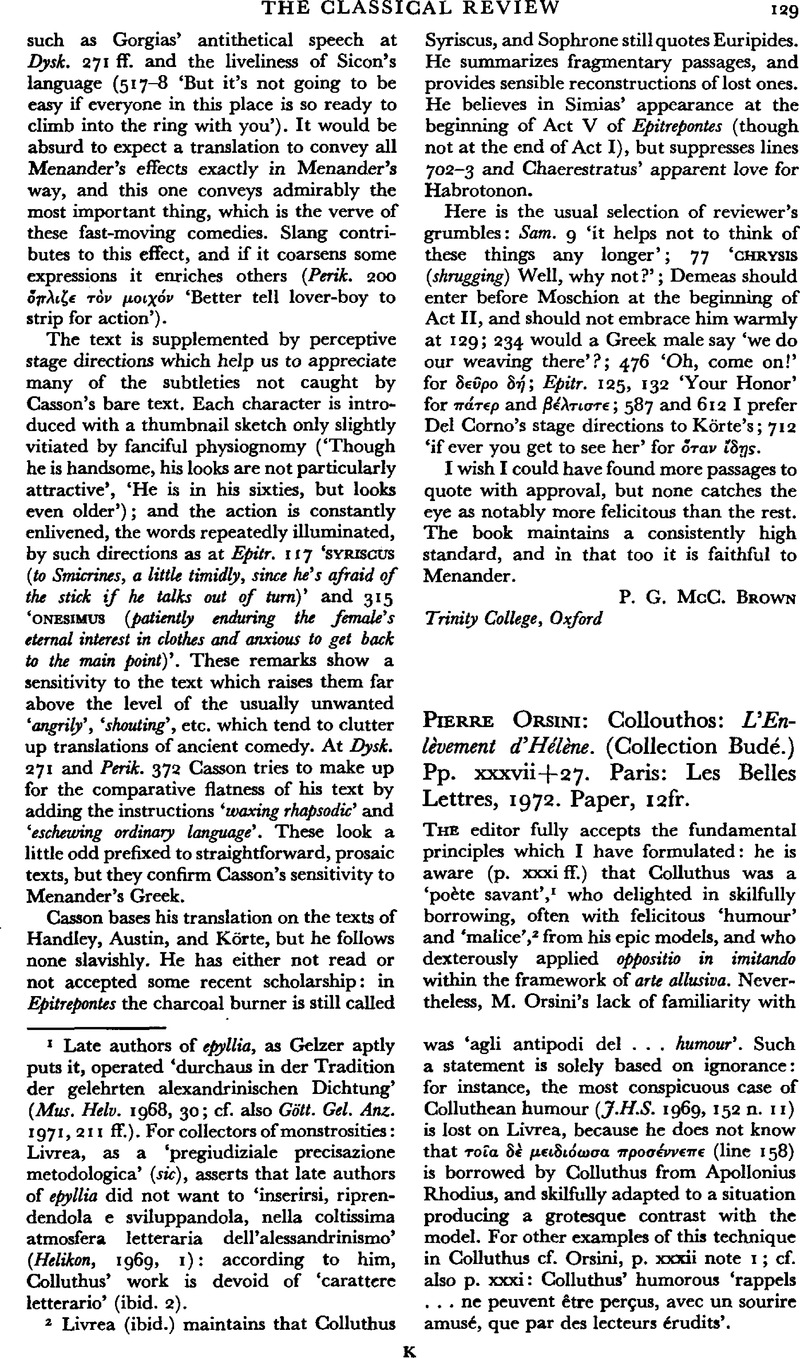Published online by Cambridge University Press: 27 February 2009

page 129 note 1 Late authors of epyllia, as Gelzer aptly puts it, operated ‘durchaus in der Tradition der gelehrten alexandrinischen Dichtung’ (Mus. Helv. 1968, 30; cf. also Gött. Gel. Anz. 1971, 211 ff.). For collectors of monstrosities: Livrea, as a ‘pregiudiziale precisazione metodologica’ (sic), asserts that late authors epyllia did not want to ‘inserirsi, riprendendola e sviluppandola, nella coltissima atmosfera letteraria dell'alessandrinismo’ (Helikon, 1969, 1): according to him, Colluthus' work is devoid of ‘carattere letterario’ (ibid. 2).
page 129 note 2 Livrea (ibid.) maintains that Colluthus was ‘agli antipodi del … humour’. Such a statement is solely based on ignorance: for instance, the most conspicuous case of Colluthean humour (J.H.S. 1969, 152 n. 11) is lost on Livrea, because he does not know that τοῑα δὲ μειόωσα προσέννεπε (line 158) is borrowed by Colluthus from Apollonius Rhodius, and skilfully adapted to a situation producing a grotesque contrast with model. For other examples of this technique in Colluthus cf. Orsini, p. xxxii note 1; also p. xxxi: Colluthus' humorous ‘rappels … ne peuvent être perçus, avec un sourire amusé, que par des lecteurs érudits’.
page 130 note 1 On such well-known ‘imitations spirituelles’ by Colluthus cf. Orsini, p. xxxii.
page 130 note 2 On Colluthus' ‘humour’ and ‘malice’ directed at gods and goddesses (such as Leto) cf. Orsini, pp. xxxif., and J.H.S., 1969, 152 n. 11.
page 130 note 3 On Leto's character cf. Ant. Liber. xxxv. 4,δίκην ἐπιβαλοῦσα and Ov. Metam. 318 non impune: she was the opposite of vi. ‘douce et clémente’!
page 130 note 4 Ἀνέτελλεν is used by Colluthus to denote a metaphorical emerging; cf. L.S.J., s.v. ἀνατέλλω, 4: edifices etc. which appear on the horizon seem progressively to emerge from the soil as one approaches them; cf. Ap. Rh. i. 601; for the opposite metaphor cf. Ap. Rh. i. 581 f. (δύετο, ἔδυνε ‘sank down the horizon’).
page 131 note 1 In Nonnus' phrase and in Colluthus', διά expresses the notion of emerging ‘hindurch’, respectively from the water (Nonnus) and from the soil (Colluthus): cf. Peek, Lex. Dionys., s.v. διά, I. 1. Διέ is no less unwanted in Colluthus’ line than it is in Nonnus'.